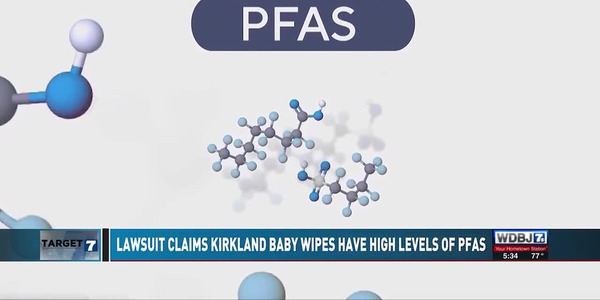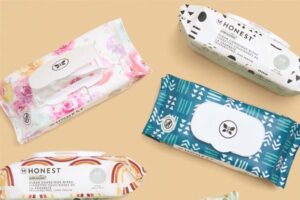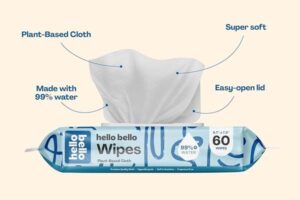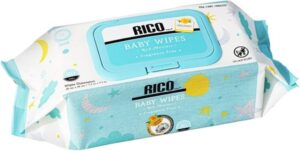
Parents often worry about the chemicals in products touching their baby's skin. Finding genuinely safe wipes can feel overwhelming. We're here to help you understand what "non-toxic1" truly means for wipes.
Yes, Honest Wipes are generally considered non-toxic. They are made with a limited number of clearly listed ingredients. They also avoid common substances like alcohol and parabens. This makes them a good choice for sensitive skin.
When we talk about "non-toxic," it means a product is formulated to be safe and gentle, especially for delicate skin. Honest Wipes achieves this by being transparent about what goes into their products. They focus on using fewer ingredients, which can reduce the chance of irritation. Plus, their wipes are often hypoallergenic and dermatologist-tested. This shows a commitment to skin safety. At BBWIPES, we also believe in this philosophy of minimal, carefully selected ingredients for maximum gentleness and efficacy in all our custom formulations.
So, what makes Honest Wipes stand out in terms of being non-toxic?
First, they use a high water content, often more than 99%. This makes the wipes naturally gentle and effective for cleansing. Second, they list their ingredients clearly, so you know what you’re using. Third, they avoid many chemicals of concern, like parabens, phthalates, and chlorine processing. This careful selection is key. Independent toxicologists also review their ingredients for safety. This extra step offers more reassurance.
Are Honest Wipes Contain PFAS?
With growing concerns about "forever chemicals," many people now ask if their favorite products, like wipes, contain PFAS2. It's a very valid question for health-conscious consumers.
No, Honest Company wipes are not intentionally made with PFAS (Per- and Polyfluoroalkyl Substances). The company states they have a "NO List™" of ingredients they don't use, which includes PFAS. Their wipes also often carry certifications like OEKO-TEX® Standard 1003, which tests for these harmful substances.

Let's dive deeper into this. Understanding PFAS and how companies address them is important.
Understanding PFAS
PFAS are a large group of man-made chemicals. They have been used in many industries and consumer products since the 1950s. You might find them in non-stick cookware, water-repellent clothing, and even some food packaging. They are used because they resist grease, water, and oil.
The problem is, they don't break down easily in the environment or in our bodies. That's why they are called "forever chemicals." Exposure to some PFAS has been linked to health issues. So, it's good that consumers and companies are paying more attention to them.
Honest Company's Approach to PFAS
The Honest Company has publicly stated its commitment to avoiding certain chemicals, including PFAS. Their "NO List™" is a list of chemicals and materials they choose not to use in their product formulations. This proactive approach is a positive sign.
Furthermore, when a product like a wipe is certified under OEKO-TEX® Standard 100, it means it has been tested for a wide range of harmful substances. This testing includes a list of specific PFAS compounds. Products must meet strict limits for these substances to achieve certification. This provides an extra layer of assurance that the product is free from intentionally added PFAS and meets high safety standards. As a wet wipe manufacturer, we know the rigorous processes involved in meeting these criteria.
Why Supply Chain Vigilance is Key
Even if a company doesn't add PFAS intentionally, these chemicals can be present due to contamination in raw materials or manufacturing processes. This is where a strong quality assurance system becomes vital. Manufacturers need to:
- Carefully vet their raw material suppliers.
- Understand the manufacturing processes of those suppliers.
- Conduct their own testing on incoming materials and final products.
This diligence helps ensure that unwanted chemicals don't find their way into the final product. My company, BBWIPES, for instance, implements a 4-Stage Inspection Protocol, which includes raw material microbial screening, to maintain the purity and safety of our wipes.
| Aspect of PFAS Concern | Honest Company's Measures | General Best Practice for Manufacturers |
|---|---|---|
| Intentional Use | Excluded via "NO List™" | Clear policy against using PFAS ingredients. |
| Testing for PFAS | OEKO-TEX® Standard 100 certification implies testing | Regular testing of raw materials and finished goods. |
| Ingredient Transparency | Publishes ingredient lists; "NO List™" guides formulation | Full disclosure of all intentionally added ingredients. |
| Manufacturing Contamination | Certification helps ensure controlled manufacturing | Strict GMPs; supplier verification; process controls. |
What Else Makes a Wipe "Truly" Non-Toxic?
Defining "non-toxic" for a wipe goes beyond just the absence of a few well-known chemicals. It’s a broader commitment to safety and gentleness.
A truly non-toxic wipe considers the source of its materials, the gentleness of its entire formulation, and the quality of its manufacturing process. It’s about a holistic approach to product safety.
The Importance of Wipe Materials
The material or substrate of the wipe itself is the foundation.
- Plant-Based Options: Many parents and environmentally conscious consumers prefer wipes made from plant-derived fibers. Examples include:
- Cotton (especially organic cotton)
- Bamboo viscose
- Wood pulp or cellulose
- PLA (polylactic acid), a plant-based bioplastic
These materials are often softer and can be more sustainable than traditional plastic-based wipes made from polyester or polypropylene. At BBWIPES, we specialize in options like 100% organic cotton and bamboo viscose because we see the demand for these high-quality, gentle materials.
- Biodegradability and Compostability: Some plant-based wipes are also biodegradable or even compostable. This is a big plus for reducing landfill waste. However, it's important to check for specific certifications and understand the conditions needed for them to break down. For instance, our compostable sachets come with a 12-month degradation guarantee under specific composting conditions.
The Formulation Philosophy
The liquid solution that moistens the wipe is just as crucial as the material.
- Hypoallergenic and pH-Balanced: These terms are important. "Hypoallergenic" means the product is formulated to minimize the risk of allergic reactions. "pH-balanced" means the wipe's acidity level is close to that of healthy skin, which helps protect the skin's natural barrier.
- Minimal Ingredients: Generally, the fewer ingredients, the lower the chance of irritation. Each ingredient should have a clear purpose.
- Preservatives: Wipes need preservatives to prevent bacteria and mold growth. The key is to use gentle yet effective preservatives. Some newer systems are derived from natural sources or are food-grade.
- Fragrance: Synthetic fragrances are a common cause of skin sensitivity. Fragrance-free options are often the safest bet for babies or those with sensitive skin. If a fragrance is used, it should ideally be from natural essential oils and clearly disclosed.
Manufacturing Standards and Quality Control
Where and how a wipe is made matters a lot.
- Good Manufacturing Practices (GMP): Look for brands that manufacture their wipes in GMP-certified facilities. This means they follow strict quality control standards throughout the production process. Our facility in Wenzhou is ISO 9001, GMP, and ISO 22716-certified, ensuring these high standards are met.
- Contamination Prevention: Rigorous cleaning protocols and controlled environments are essential to prevent microbial contamination or cross-contamination with allergens or unwanted chemicals.
- Testing: Reputable manufacturers conduct extensive testing, including:
- Raw material testing
- In-process checks
- Finished product testing (e.g., for microbial safety, stability, and performance).
Our 4-Stage Inspection Protocol at BBWIPES, for example, includes raw material screening, in-line pH monitoring, tensile strength validation, and final packaging seal integrity testing.
How Can I Verify if My Wipes Are Truly Non-Toxic and Safe?
It's great to trust brands, but it's also smart to do your own checks. Knowing how to verify claims gives you more confidence.
To verify if wipes are non-toxic, carefully read the ingredient list. Look for trusted third-party certifications. Also, research the brand's transparency about their sourcing and manufacturing standards.
Here’s how you can do that:
Decode the Ingredient List
Transparency is key.
- Look for full disclosure: Brands should list all intentionally added ingredients.
- Recognize common names: Ingredients are often listed by their scientific names (INCI names). A quick online search can help you understand what they are.
- Identify potential irritants: Be aware of common culprits like certain preservatives (e.g., methylisothiazolinone or MI, which The Honest Company avoids), synthetic fragrances, dyes, alcohol (can be drying), and harsh surfactants like SLS or SLES.
- Resources: Websites like the Environmental Working Group (EWG) Skin Deep database can offer information, but always consider multiple sources and the concentration of ingredients.
Understand Third-Party Certifications
Certifications from independent organizations provide an extra layer of trust. They show that a product has been tested against specific standards.
- OEKO-TEX® Standard 100: As mentioned, this tests for harmful substances, including certain PFAS, heavy metals, pesticides, and allergenic dyes. It’s a good one for textiles, including wipe materials.
- EWG Verified™: This mark means products avoid EWG's chemicals of concern and meet their strictest health standards, along with full transparency.
- MADE SAFE®: This certification means products are made without known harmful chemicals.
- NSF International: Certifies product safety and quality, sometimes for specific categories like organic personal care.
- Dermatologically Tested / Pediatrician Approved: These indicate some level of testing for skin compatibility, though the rigor can vary.
- Cruelty-Free (e.g., Leaping Bunny): Ensures no animal testing was involved in any stage of product development. BBWIPES is proud to be certified by Cruelty-Free International Leaping Bunny.
- FSC-Certified Packaging: This means the paper-based packaging materials come from responsibly managed forests. We also prioritize FSC-certified sourcing.
Research the Brand's Ethos
A company's overall commitment to safety and transparency often tells you a lot.
- Check their website: Look for detailed information about their ingredient philosophy, sourcing practices, and manufacturing standards.
- Ask questions: Don't hesitate to contact the company directly if you have specific questions about their ingredients or testing. A transparent company should be happy to provide answers. As a global business director, I always encourage open communication with our clients.
- Read reviews with a critical eye: Customer reviews can be helpful, but remember that individual experiences can vary. Look for patterns rather than isolated comments.
Being an informed consumer helps you make the best choices for your family's health and well-being.
Conclusion
Honest Wipes are a solid choice if you're looking for non-toxic options, as they avoid many harsh chemicals and are not formulated with PFAS. Verifying wipe safety involves checking ingredients, looking for certifications, and trusting transparent brands.
-
Understanding the definition of non-toxic is crucial for parents seeking safe products for their babies. Explore this link for detailed insights. ↩
-
PFAS are linked to health issues, making it vital to understand their impact. This resource will provide comprehensive information on PFAS. ↩
-
This certification ensures products are free from harmful substances. Learn more about its significance for consumer safety. ↩







